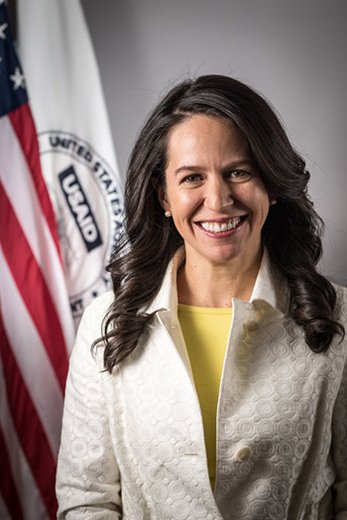Marcela Escobari ’96 Turns Humanitarian Theory into Real-Life Practice

Marcela Escobari ’96 wants to eradicate poverty. But after two decades in international development, she knows it’s an ambitious goal. “It will not have one solution,” she says. “There’s no silver bullet.”
Escobari has spent her career focused on how to make societies more prosperous, attempting to put theoretical ideas into real-life practice.
Her experience reaches back to her time at Swarthmore. “I was always interested in social causes,” she says. As a student, Escobari accepted an internship in her home country of Bolivia working with indigenous communities.
“I was shocked at the inefficiency of the nonprofits and multilateral organizations I was working with on the ground,” she says. “Good intentions are often not enough.”
That led Escobari to an unusual first job for someone with the ultimate goal of ending poverty: working as an investment banker on Wall Street.
“I wanted to know how markets worked and how the most efficient organizations ran,” she says, “so I could bring that rigor to these problems.”
Escobari applied her training soon after, working with industries in developing countries and helping them compete globally. Her work took her to coffee farmers in Rwanda, tourism operators in Colombia, and music producers in Jamaica.
When Escobari eventually became director of Harvard’s Center for International Development (CID), she worked with some of the leading thinkers in the field, making their academic ideas “action-orientated, practical, and usable.” Under her leadership, the CID expanded from a staff of three to 70 with a fivefold increase in its budget, becoming one of the top international development think tanks in the world.
“In 2016, I got a call out of the blue from the Obama White House,” remembers Escobari. “I have always admired the values of this country and jumped at the opportunity to serve.”
Following her Senate confirmation, Escobari was appointed USAID assistant administrator for Latin America and the Caribbean. She took the approach she honed at Harvard—bringing “rigor, data, and practicality” to inform U.S. policy on Latin America and guide her work in 17 countries.
Escobari’s approach focused on the root causes of illegal migration—poverty and violence—and building relationships with Central American countries to address them. She was also at the table for major developments in Latin American policy, assisting Colombia in its peace process, providing humanitarian assistance in Haiti after the hurricane, and developing options to confront the political and economic crises in Venezuela.
As a political appointee, Escobari stepped down from her USAID role with the change in presidential administrations. After working on the larger organizational level for so long, she’s thinking about the ways our everyday decisions can make a difference.
“If people see what’s at stake,” she says, “they might be willing to make different choices: how we consume, how we invest, and what we ask our politicians to do.”
Now a visiting fellow at the Brookings Institution, Escobari is weighing her next step. Whatever it might be, she sees her work as a continuation of her Swarthmore experience.
“The fervor and action orientation that’s embedded in the culture of Swarthmore—not just thinking good thoughts but rolling up your sleeves and doing something about it,” she says, “that’s what’s needed today more than ever.”
A native of Bolivia, Escobari graduated from Swarthmore College with a B.A. in economics and holds a master’s in public policy from the Kennedy School of Government at Harvard University.
Read more stories from the Swarthmore College Bulletin.


